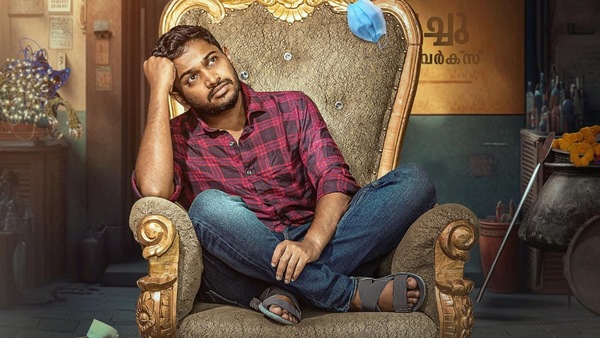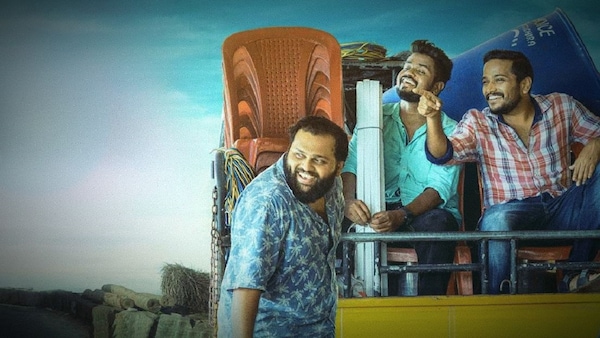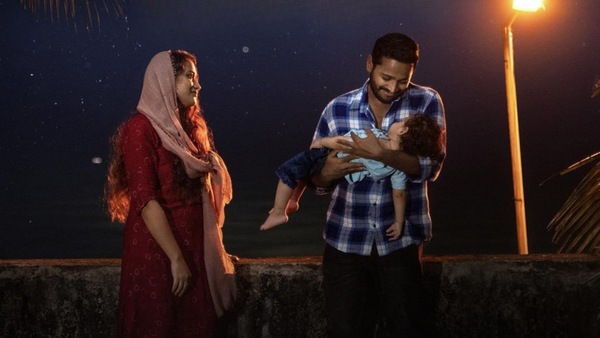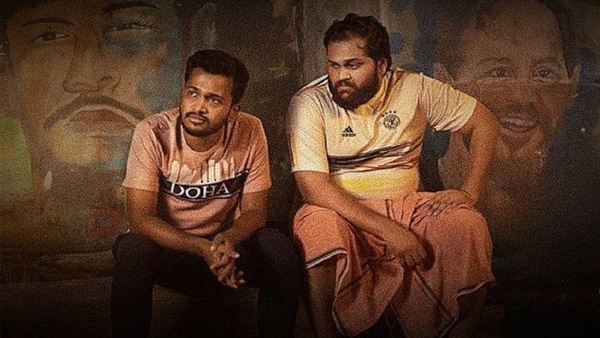Newsletter | Basil Joseph Comes Of Age In Kadina Kadoramee Andakadaham
There is an inherent, poignant honesty in Kadina Kadoramee Andakadham, and as protagonist Bachu, Basil Joseph turns in a career-best performance, writes Neelima Menon.

Basil Joseph in Kadina Kadoramee Andakadaham
Last Updated: 03.08 PM, Jun 05, 2023
This column was originally published as part of our newsletter The Daily Show on June 5, 2023. Subscribe here. (We're awesome about not spamming your inbox!)
***
BASHEERUDIN aka Bachu in Kadina Kadoramee Andakadaham, who lives on the shores of a coastal town in North Kerala, is struggling to stay afloat. Born into a conservative Muslim family, Bachu lives with his mother and siblings while his father is employed in the Gulf. After a spate of odd jobs, Bachu finally finds a way to survive at a time when the COVID-19 pandemic has brought all their livelihoods to the brink.
Kadina Kadoramee Andakadaham is written by Harshad and directed by debutant Muhashin. Considering the torrent of films that tumbled out of the pandemic and revolved around it, Kadina Kadoramee Andakadaham tunnels into the ordinariness of life. It talks about humans who are caught in their own little conundrums of relationships, heartbreaks, emotional chaos, and career shifts. The writing is simple, and quite a surprise coming from Harshad, who is known for incorporating his religious and political leanings into his scripts quite bluntly (Unda, Puzhu).

It’s one of those narratives that is very rooted in its terrain — so you are privy to the lives of the Malabar Muslims, their socio-cultural ethnicity, occupation and other paraphernalia. Homes are occupied by women who cover their heads with a shawl while tending to their families, and men go about earning their daily bread. Houses painted in bright hues, snugly attached to each other, just as the people inside bond over football and biryani.
Even within these spaces, however, there are reasonable attempts to challenge traditional gender roles. When Bachu’s sister Bushara chooses to stay back at home following a misunderstanding with her husband, despite family and society slandering her, she refuses to buckle under pressure. And when her husband casually tells her to let it go, she demands an apology. Even the misunderstanding stems from chauvinism, as he feels betrayed when she offers to financially help a male friend without his consent. When Bachu, who is patriarchal, resents her decision, she doesn’t pay him much mind either.

Bachu is your average Joe, besieged by relatable struggles. He is under pressure to migrate to the Gulf like his father, but Bachu wants none of it. He is determined to prove himself to his family, and tries to manufacture masks to make money. Even when the people around him have only good things to say about his father, Bachu is angry with him for not being around when he needed him. The narrative also marks Bachu’s coming-of-age arc from a young man battling with his insecurities and ego to eventually making peace with his reality.
Some of the plot devices are very effective. The father is only heard over the phone but we quickly form a compassionate image in our mind’s eye. Though he gets the familiar sketch of a Gulf migrant, what’s endearing is his romance with his wife, which seems to have survived decades. The conversations between them are prosaic, but the lingering love and passion are unmistakable.
The same familiarity is there in the characterisation of the mother as well: a celluloid mother stereotype made beguiling by the actor (Sreeja Ravi) who plays her. She adds subtle little touches to this gentle woman who only knows to love and worry for her family. A mother who is very similar to Jameela in Sudani From Nigeria — caught between her son and her husband. In hindsight, most of the characters have this relatability that makes them easy to empathise with. They all exist within the parameters of a traditional space, but find ways to move beyond the mundanity of their existence.

The beauty comes in the little things — there is a poignant scene that has Bushara’s male friend holding back his tears as he awkwardly tries to comfort her. How delicately they emphasise the undercurrents of patriarchy, friendship, and compassion in that scene! Bachu’s mother blushes like a new bride, when her husband tells her he misses having her around to apply balm.
There are a handful of characters who rally around Bachu’s life. And they all seem to imprint firmly in our minds. Azee, the best friend who doesn’t flinch from holding up a mirror to Bachu, has a surprisingly liberal and rational mind. In a way, he has all the qualities that are lacking in Bachu. Then Bachu’s former girlfriend, now a single mother, has a very warm bond with his father and clearly hints that she is there to eventually help Bachu anchor his life. In that way, there’s a bit of stereotype-busting: in a community where women are discouraged from having male friends or opinions, a single mother seems to have some agency.

There is an inherent honesty in Kadina Kadoramee Andakadham that hits all the right notes. Except for the overt warmth that’s associated with certain characters, there isn’t a false note in the narrative. At no point does melodrama trickle into the narrative, but one still feels a palpable grief for the characters, which lingers long after the film ends.
Bachu has to be Basil Joseph’s finest act to date. The director-turned-actor who has gleefully played the boy-next-door roles with ease brings a never-before depth to his performance. It’s a well-written role and Basil as Bachu gets better as the character evolves. His angst, fragile ego, and misplaced anger are ably manifested by the actor. And he truly comes on his own in the scenes where he is battling grief. Look out for the scene when he sits alone, listens to his father’s WhatsApp voice notes, and starts weeping and it’s difficult to watch it without moist eyes. Or the conversation he has with his former lover about his father.
Basil’s growth as an actor is a revelation indeed. What started as casual goofy-friend-of-the-hero roles have gradually given way to characters with complexities — the depressed and insecure Joymon who craves attention in Jan-E-Man, the out-of-sorts veterinary inspector in Palthu Janwar, or the entitled, abusive husband in Jaya Jaya Jaya Jaya Hey. Basil has the deceptive naivete of a Sreenivasan — and therefore, just like the veteran actor, grey sits as comfortably on him as goofiness. A director and an actor to look forward to for sure.
